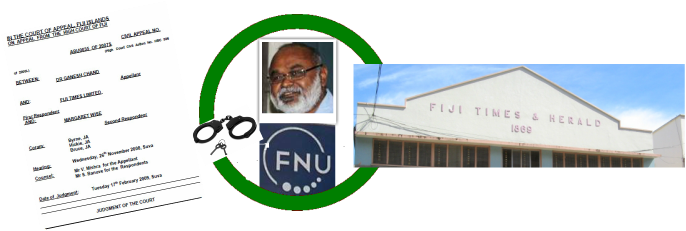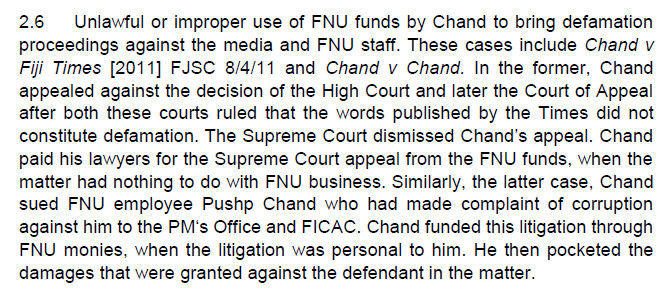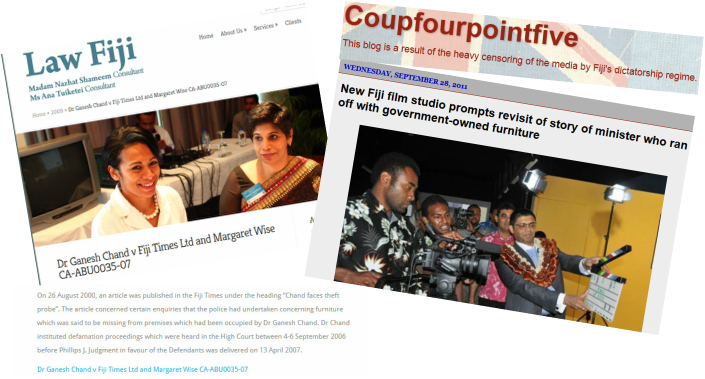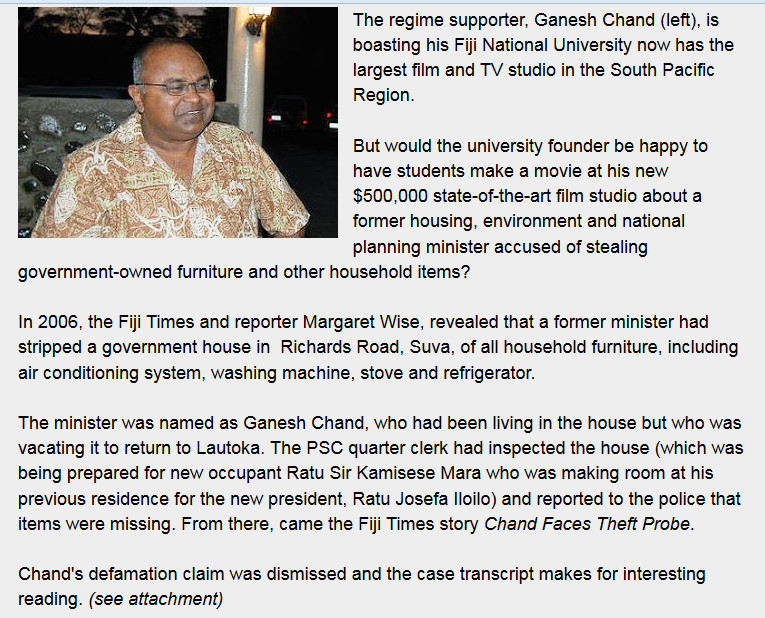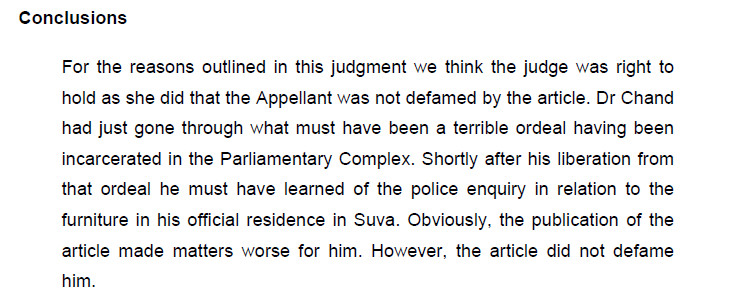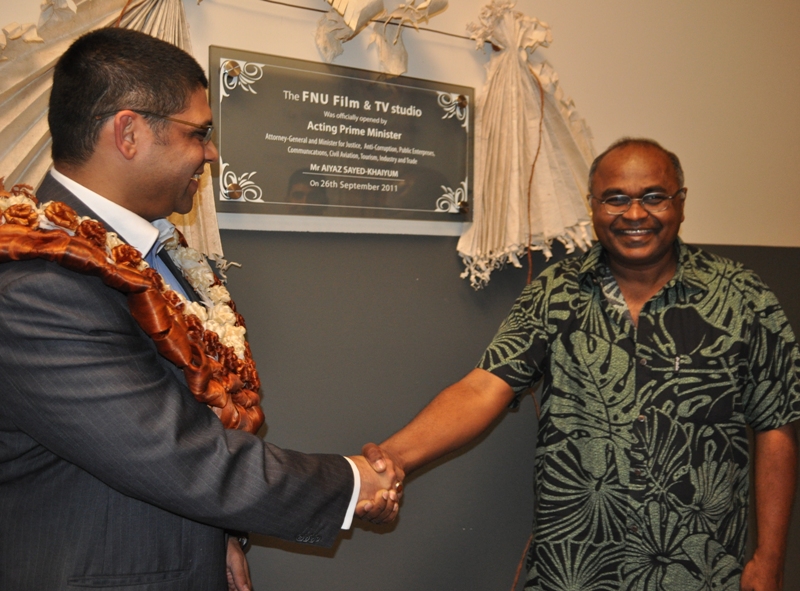FROM FNU's former MFP, ANDREW SINGH, TO FICAC:
32. The complex nature of modern society carries with it the possibility that the conduct of any individual may for various reasons such as national security and the prevention of terrorism, money laundering and other such crimes or offences are subjected to scrutiny by the relevant authorities, and such matters are generally taken for granted, and the fact that there is some investigation about some crime or offence would not necessarily tarnish the reputation of the person subjected to such investigation. Not only the affairs of terrorists and other criminals, but even those of corporations, professionals, businessmen, and politicians are increasingly subjected to scrutiny and comment, and modern society is sophisticated enough not to be overly sensitive to these intrusions or to look down upon such persons whose affairs are subjected to scrutiny and comment.
33. In the result, we hold that the High Court and the Court of Appeal did not err in law in holding that it is not per se defamatory to allege or imply that a person is suspected of an offence, and conclude that the Court of Appeal properly considered and decided on the same in its decision.
Conclusions
34. For the aforesaid reasons, we hold that both questions on which special leave to appeal was granted by this Court have to be decided in favor of the Respondent, and the appeal should be dismissed and the decisions of the High Court of Lautoka and the Court of Appeal of Fiji, affirmed. In all the circumstances of this case, we do not make any order for costs. Dated at Suva this 08th day of April 2011.
Saleem Marsoof
Judge of the Supreme Court
Sathyaa Hettige
Judge of the Supreme Court
William Calanchini
Judge of the Supreme Court
Solicitors:
Mishra Prakash & Associates, Solicitors for the Appellant
Howards Lawyers, Solicitors for the First Respondent
"I state that the meaning of my letter has been twisted and turned to make it look defamatory, further more writing any letter to the Honourable Prime Minister or FICAC should not be tried in the Court of Law, but proper investigation should have taken place to justify my grievances therefore I deny the same." Pushp Chand
6. The proposed statement of defence is annexed to the affidavit in support and in paragraph 4 of the statement of defence state as follows
'4. That in reply to paragraph 4(a) to (q) of the plaintiff's statement of claim I state that the meaning of my letter has been twisted and turned to make it look defamatory, further more writing any letter to the Honourable Prime Minister or FICAC should not be tried in the Court of Law, but proper investigation should have taken place to justify my grievances therefore I deny the same.'
7. The Defendant had worked under the Plaintiff and he is also the author of the alleged defamatory letter and has to be considered as a witness to the alleged irregularities. He also alleged that he was directly aggrieved by the conduct of the Plaintiff. So the evidence of the Plaintiff is crucial for the ascertainment of the truth of the statements alleged in the said letter. The Plaintiff has not annexed the said defamatory letter to the affidavit in opposition to this application. The merits and demerits of the said letter and its content cannot be analysed at this stage.
8. The above mentioned paragraph in the proposed statement of defence admits writing a letter to the Prime Minister and also state the contents were not defamatory and further investigations were needed to ascertain the truth of the allegations and his main reason for writing the said letter was to 'justify' his 'grievance'.
9. The said proposed defence filled in person indicates a defence of justification and in such circumstances where the Defendant is also a witness to the alleged incidents, I cannot on affidavit evidence evaluate the merits of the defence and reject it, on the basis that there is no merits in the defence. The Defendant has worked in the said university where the Plaintiff is Vice Chancellor. It is clear that when a party pleads justification in an action for defamation where the Defendant is also a witness to alleged incidents, the said defence needs to be tested in a trial and cannot be rejected at this stage as having no merits.
10. The reason given for the delay in filing a statement of defence that resulted a default judgment being entered is the ignorance of the procedure by the Defendant who has filled the acknowledgment of service without an assistance from a solicitor. He is appearing in person for this application to set aside the default judgment. Though this cannot be a reason for default, the explanation for default can be accepted.
11. The Defendant had appeared in court to the summons for assessment of .damages and has filled this application to set aside the default judgment on 30th August, 2011. There is no affidavit of service of default judgment, which was entered on 10th March, 2011. The summons for the assessment of damages was served on the Defendant and an affidavit of service was also filled. The Plaintiff did not turn up for hearing on any of the dates for assessment of damages and the hearing did not commence. The application for setting aside the default judgment cannot be considered as an inordinate delay.
C. PREJUDICE TO THE PLAINTIFF
12. The Plaintiff has followed the procedure correctly and obtained default judgment and it is a regular default judgment. If the default judgment is set aside there is a delay, but even if that is not set aside still the Plaintiff needs to prove damages and assessment of damages needs to be proved with necessary oral and or documentary evidence. In the circumstances, if the default judgment is set aside it cannot be considered as a prejudicial to the Plaintiff, other than delay. The delay can be compensated by an award of cost against the defaulting party. Considering the circumstances of the case, I will allow the application to set aside the default judgment subject to a cost of $ 500 being paid by the Defendant to the plaintiff.
